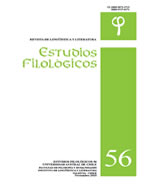Rhetoric organization and coherence relations in the biology abstract
Main Article Content
Abstract
Due to the importance that abstracts holds in scientific communication, during the last decades several specialists have studied it. Many of them have focused on the rhetorical organization of this genre (Dos Santos 1996; Hyland 2000; Martín-Martín 2003; Lorés 2004), and their results have systematically demonstrated that such organization varies among disciplines (Hyland 2000; Samraj 2002, 2005; Tseng 2011; Nasser 2013). The latter reveals that each discipline has fixed its own ways of building and transmitting knowledge. From this scenario, and understanding that abstract -as any other academic genre- vary depending on the discipline, the present research describes the abstract of biology in terms of its rhetoric organization and the way in which it establishes coherence. In order to account for rhetorical organization, we utilize the proposal of Hyland (2000) as a framework for initial analysis, while we use the analysis framework developed by Ibáñez, Moncada y Santana for coherence relations (in press). The research corpus is constituted by 80 abstracts in Spanish language, which belong to scientific research articles published by specialized journals. Our data show the scarce occurrence of moves as 'purpose' and the high frequency of others as 'method', which has enabled the identification of different rhetoric configurations through which abstracts are organized in this discipline. Regarding coherence relations, not only have we identified prototypical ones in this genre, but also those that characterize each move.

